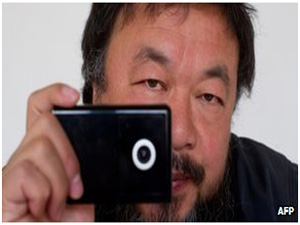



Date:17/04/12
 China's efforts to stifle dissent by controlling what people say online are doomed to fail, a renowned Chinese artist has said.
China's efforts to stifle dissent by controlling what people say online are doomed to fail, a renowned Chinese artist has said.
The warning was issued by Ai Weiwei in an article written for the UK's Guardian newspaper.
China has recently introduced rules that seek to ensure that when people go online they use their real names. Mr Ai said although the rules might delay the day government censorship failed, there was no doubt it would.
"In the long run, they (the government) must understand it's not possible for them to control the internet unless they shut it off - and they can't live with the consequences of that," he wrote.
Camera ban
The rise of blogs, social media and electronic communication had given rise to new sense of freedom among Chinese people, he said. The government may still put out news via officially backed channels, said Mr Ai, but the net meant that people did not just have to accept this view of the world. Instead, even before the official version was printed or broadcast people have discussed it online and, in the process, were learning how to exercise their own judgement and rights. This relative freedom to talk would give rise to bigger changes that the government would not be able to curb, said Mr Ai.
"The internet is uncontrollable. And if the internet is uncontrollable, freedom will win," he said.
Mr Ai's most recent brush with the Chinese authorities came earlier in April when he was told to turn off webcams he had set up throughout his house. The cameras were installed, he said, as a way to encourage transparency.
In April 2011, Mr Ai was detained by the police in China for 81 days during a crackdown on political activists. He is now banned from leaving Beijing.
China warned on web censorship plans
 China's efforts to stifle dissent by controlling what people say online are doomed to fail, a renowned Chinese artist has said.
China's efforts to stifle dissent by controlling what people say online are doomed to fail, a renowned Chinese artist has said.The warning was issued by Ai Weiwei in an article written for the UK's Guardian newspaper.
China has recently introduced rules that seek to ensure that when people go online they use their real names. Mr Ai said although the rules might delay the day government censorship failed, there was no doubt it would.
"In the long run, they (the government) must understand it's not possible for them to control the internet unless they shut it off - and they can't live with the consequences of that," he wrote.
Camera ban
The rise of blogs, social media and electronic communication had given rise to new sense of freedom among Chinese people, he said. The government may still put out news via officially backed channels, said Mr Ai, but the net meant that people did not just have to accept this view of the world. Instead, even before the official version was printed or broadcast people have discussed it online and, in the process, were learning how to exercise their own judgement and rights. This relative freedom to talk would give rise to bigger changes that the government would not be able to curb, said Mr Ai.
"The internet is uncontrollable. And if the internet is uncontrollable, freedom will win," he said.
Mr Ai's most recent brush with the Chinese authorities came earlier in April when he was told to turn off webcams he had set up throughout his house. The cameras were installed, he said, as a way to encourage transparency.
In April 2011, Mr Ai was detained by the police in China for 81 days during a crackdown on political activists. He is now banned from leaving Beijing.
Views: 1399
©ictnews.az. All rights reserved.Similar news
- 24% of U.S. Adults have made phone calls on the Internet
- UNESCO puts sustainable learning online
- Australia gives incentives for the use of telehealth
- US launches computer programme for poor kids
- UN declares web access as human right
- Facebook growth slows in stalkerbase heartlands
- One Third of Millionaires Use Social Media
- Facebook Seeks Bigger Role in Software for Mobile Apps
- Icann increases web domain suffixes
- IBM launches new social networking platform for enterprises
- Google Notches One Billion Unique Visitors Per Month
- Internet providers cut international channel renting costs by 60%
- Azerbaijan launches standard time on internet
- Icann launches facility to ease DNSSec adoption
- Social network data mining yields worrying results for traditional media





















